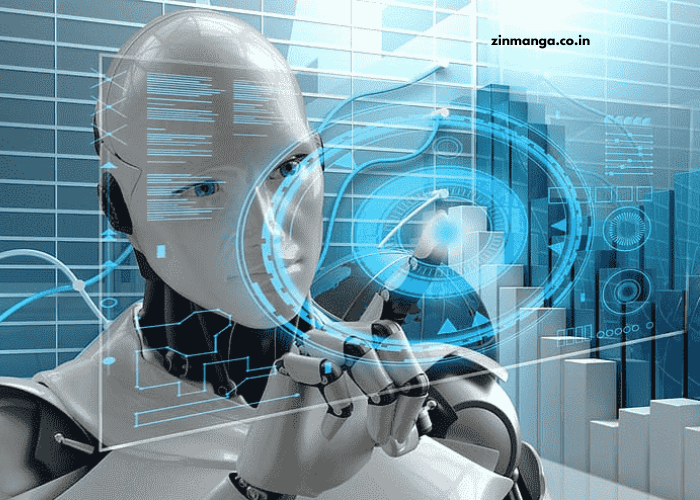In today’s fast-paced world, technological advancements are reshaping every aspect of our lives, offering new opportunities and solving challenges that once seemed insurmountable. From artificial intelligence (AI) to quantum computing, emerging technologies are transforming industries and creating a ripple effect that extends to all sectors of society. The future is being forged through the application of these innovations, and they promise to significantly alter how we live, work, and interact with the world.
In this article, we explore the latest technology innovations that are poised to transform our future, examining their impact on various industries and society at large. Let’s delve into the cutting-edge developments driving the next wave of innovation.
Artificial Intelligence (AI) and Machine Learning: Revolutionizing Industries
The Role of AI in Shaping the Future
Artificial Intelligence (AI) has rapidly evolved from a concept in science fiction to a transformative force in the real world. With the ability to process and analyze vast amounts of data, AI systems can make decisions, learn from experiences, and perform tasks that once required human intervention. AI is reshaping industries, from healthcare and finance to entertainment and manufacturing, by improving efficiency, enhancing customer experiences, and creating new business opportunities.
Machine learning (ML), a subset of AI, allows systems to automatically learn and improve from experience without explicit programming. In healthcare, AI-driven solutions are enabling more accurate diagnostics, personalized treatment plans, and drug discovery. In the financial sector, AI algorithms are used for fraud detection, risk assessment, and algorithmic trading.
AI in Automation and Robotics
One of the most exciting applications of AI is in automation and robotics. Intelligent robots are increasingly being deployed in factories, warehouses, and even hospitals to perform tasks such as assembly, packaging, and surgery. These robots are capable of adapting to new tasks, improving over time through machine learning, and working alongside humans to enhance productivity.
The rise of AI-powered automation has sparked concerns about job displacement, but it also opens the door to new opportunities in areas such as robot maintenance, programming, and AI system management. The future of work will undoubtedly involve a collaboration between humans and machines, where each contributes their strengths to achieve optimal outcomes.
Quantum Computing: Unlocking New Frontiers of Computational Power
What Is Quantum Computing?
Quantum computing is another game-changing innovation that promises to revolutionize industries by solving complex problems that classical computers struggle to tackle. At its core, quantum computing leverages the principles of quantum mechanics to perform calculations exponentially faster than traditional computers.
While classical computers use bits to represent data as either a 0 or a 1, quantum computers use quantum bits or qubits, which can exist in multiple states simultaneously. This ability to perform parallel computations at an unprecedented scale could lead to breakthroughs in fields such as cryptography, materials science, artificial intelligence, and drug development.
The Impact of Quantum Computing
The potential applications of quantum computing are vast. In healthcare, quantum computers could accelerate the discovery of new drugs by simulating molecular interactions at a level of detail previously unimaginable. In cybersecurity, quantum algorithms could break current encryption methods, but they could also lead to the creation of more secure cryptographic systems based on quantum principles.
Though quantum computing is still in its infancy, several tech giants, including Google, IBM, and Microsoft, are investing heavily in its development. In the coming years, we can expect quantum computers to solve problems that have remained unsolvable, ushering in an era of unprecedented technological progress.
5G Connectivity: The Backbone of the Digital Future
What Is 5G, and Why Is It Important?
5G is the fifth generation of mobile network technology, offering ultra-fast internet speeds, lower latency, and the ability to connect a vast number of devices simultaneously. While 4G revolutionized mobile connectivity, enabling streaming, social media, and mobile apps, 5G takes this a step further by providing speeds up to 100 times faster than 4G and reducing latency to near-zero levels.
This leap in connectivity will be crucial for the growth of the Internet of Things (IoT), smart cities, autonomous vehicles, and advanced augmented reality (AR) and virtual reality (VR) applications. With 5G, real-time communication between devices will become seamless, enabling innovations that were previously impractical.
5G’s Impact on Industries
5G is set to transform multiple sectors, including healthcare, manufacturing, and transportation. In healthcare, remote surgeries and telemedicine can benefit from the high-speed, low-latency nature of 5G, ensuring precise operations even when performed from a distance. In transportation, autonomous vehicles will rely on 5G to communicate with other vehicles and infrastructure, reducing accidents and improving traffic flow.
Moreover, 5G will support the widespread adoption of smart cities, where interconnected devices will monitor traffic, energy consumption, and public safety, contributing to a more efficient and sustainable urban environment.
Blockchain Technology: Transforming Data Security and Transparency
What Is Blockchain?
Blockchain technology is a decentralized, distributed ledger system that allows data to be stored across multiple computers in such a way that it is secure, transparent, and tamper-proof. Originally popularized by cryptocurrencies like Bitcoin, blockchain has far-reaching implications beyond the financial sector.
The key advantage of blockchain lies in its ability to provide secure and transparent transactions without the need for intermediaries. Each transaction is recorded in a “block” and added to a “chain,” ensuring that the data cannot be altered once it is recorded.
Blockchain Applications in Various Sectors
Blockchain technology is transforming industries by increasing data security, reducing fraud, and enhancing transparency. In supply chain management, blockchain allows companies to track the movement of goods from production to delivery, ensuring that products are authentic and have not been tampered with.
In the financial industry, blockchain is revolutionizing cross-border payments, making them faster, cheaper, and more secure. Additionally, smart contracts, which are self-executing contracts with predefined conditions, are becoming increasingly popular for automating transactions and agreements.
Blockchain’s potential to improve data security and transparency is also being explored in sectors such as healthcare, voting systems, and intellectual property management, promising a future where trust and accountability are built into the digital infrastructure.
Augmented Reality (AR) and Virtual Reality (VR): Enhancing the Digital Experience
What Are AR and VR?
Augmented reality (AR) and virtual reality (VR) are technologies that alter our perception of the physical world by overlaying digital content (AR) or immersing us in a completely digital environment (VR). While both AR and VR are often associated with gaming and entertainment, their applications extend far beyond that.
AR superimposes digital information—such as images, sounds, and texts—onto the real world through devices like smartphones, tablets, and smart glasses. VR, on the other hand, creates fully immersive digital environments through headsets, offering users an experience that feels completely separate from the physical world.
AR and VR’s Impact on Business and Society
In education, AR and VR are revolutionizing the way we learn by providing immersive experiences that make complex subjects more engaging and easier to understand. For example, medical students can practice surgery in a virtual environment, while history students can explore ancient civilizations through interactive AR applications.
In retail, AR allows customers to try on clothes virtually or visualize how furniture would look in their homes. In real estate, VR enables potential buyers to take virtual tours of properties from anywhere in the world. The potential of AR and VR to create new forms of entertainment, improve learning experiences, and enhance shopping experiences is driving their widespread adoption.
Conclusion: The Future Is Now
The latest technology innovations are transforming our future in profound ways, impacting industries and societies across the globe. From AI and machine learning to quantum computing, 5G connectivity, blockchain, and AR/VR, these technologies are not just futuristic concepts—they are already making a tangible difference in the world.
As these technologies continue to evolve, they promise to unlock new possibilities, solve complex challenges, and create new opportunities for innovation. However, as we embrace these advancements, we must also consider their ethical implications, ensuring that they are used responsibly and for the benefit of all.
The future is being shaped by these technological innovations, and we are only beginning to scratch the surface of their potential. The next few decades will likely bring even more groundbreaking developments, propelling us into a world that is smarter, more connected, and more dynamic than ever before.
As we move forward, it’s clear that technology will continue to be a driving force in shaping the world of tomorrow, transforming industries, improving lives, and solving some of humanity’s most pressing challenges.




